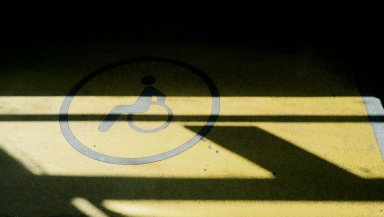
As someone who loves the Paralympics I've been watching as much as I can.
Ellie Robinson's poolside speech was wonderful, part of which put into words the thing that summed up the journeys of so many: "If I have to crawl on my hands and knees to the blocks, I will do it."
Many newly disabled people tweeted after the event saying it had encouraged them to keep going, and parents tweeted to say their children were transfixed as they saw people with the same disabilities as them competing. Having heroes who look like us is rare in our world.
I'm informed by non-disabled people every four years (or five this time!) that the Paralympics must have improved acceptance of disability, and every time I have to say: no, it hasn't.
Although it's a wonderful celebration of disability and achievement, it's a very narrow view of the life of disabled people. Even the Paralympians themselves have fought to lose the 'superhuman' rhetoric and thankfully won, and yes, even they struggle with inaccessible buildings just like me.
Some of my disabled friends have been asked what their sport is - just because they either have a cool wheelchair or a prosthetic limb. Just like non-disabled people, not all of us are sporty! Although, if blind extreme crochet was a Paralympic event I think I might manage a bronze medal!
Andrew Parsons, leader of the Paralympic movement, summed up my thoughts in his closing speech: "Disabled people should not have to do exceptional things to be accepted."
Paralympians are seen as 'acceptable' disabled people because they are exceptional. When you look at the rising hate crime rates among the rest of us, you can see just how many of us are not acceptable disabled people.
Non-disabled people look at the Paralympics and how the athletes are applauded and assume all is well in the world when it isn't.
This is why, as the Paralympics began, the 'We the 15' campaign was launched. The thinking behind the title is that 15% of the world's population are disabled (although in the UK we would say 22% of the nation and 26% in the USA). Its purpose is to improve the lives of more than one billion disabled people by 2030.
I must admit, I'm alway cynical when it comes to these campaigns. This one has many powerful organisations and names behind it, and I hope against hope that they can make a difference across the world.
The BBC have an article about it here including some good quotes and interviews, but I love the campaign video the best.
This opens with some of the comments we regularly get from non-disabled people. It is then followed by the normal stuff we do day to day, just like anyone else.
As someone who regularly gets congratulated for going to the toilet, choosing my own clothes and crossing the road - in reality, like everyone else - all I'm doing is going about my everyday life. I just have more obstacles in the way than people without disabilities.
Going back to Ellie Robinson's comments, she made another insightful point when she said she wanted things to end on her terms. I know what she means - disability often takes choice away and disability on my own terms is hard work.
Between the comments about not having to do exceptional things to be accepted and Ellie's comments about ending on her own terms, I think there are things the Church could take note of.
In the US, the Church campaigned hard to be exempt from the Americans with Disabilities Act, and won. With the UK equivalent (Equalities Act) the same exemption hasn't happened here, but I'm regularly asked "What is the least we can do and still be legal?"
That puts things in context, doesn't it?
The swimmer Maisie Summers-Newton, who won gold in the Paralympics this year, was encouraged into swimming by seeing Ellie Simmonds swim - someone like her. In the same way, many disabled people in the Church want to see people like ourselves in leadership, preaching and ministering. One of the reasons we don't see this is because as children and young people we didn't see people like us in those roles, which says: you're not welcome in these roles.
Yes, we have a few stars of disability faith, in the same way we have 'Paralympic stars', but this also makes people think that because we have them, we must be doing ok in matters of church and disability - right?
I give the same answer as I did before. No, we're not.
We often have to do church on the terms of others because what we need is seen as a problem, too difficult or too expensive.
In the We the 15 video there is a Muslim woman praying. She makes the point she isn't praying for healing, she's praying for a handbag!
In church circles, we often face the constant pressure to be cured. This tells us God only wants the healed, the perfect, the whole. Cured seems to be the only 'acceptable' way of being. This needs to stop.
So what do we want?
We want a conversation. We want church on God's terms. We want to be accepted.
Kay Morgan-Gurr is Co-Founder of the Additional Needs Alliance, part of the Evangelical Alliance Council. She blogs at www.ThePonderingPlatypus.com. Follow her on Twitter @kaymorgan_gurr













